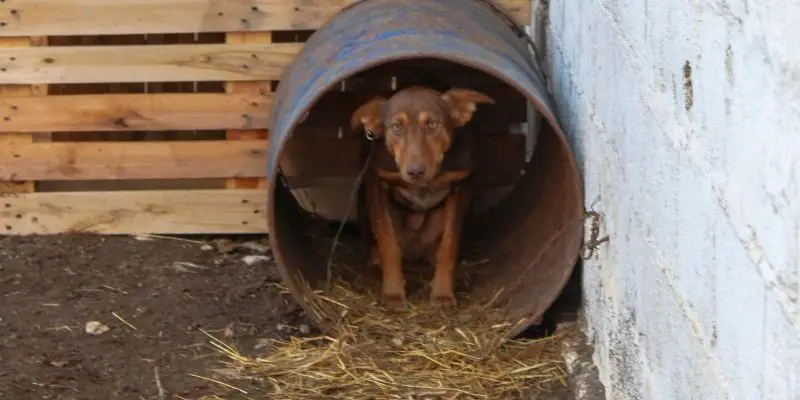“I have a dog, and my dog doesn’t bark.” Such an admission can be a source of confusion for your friends and family members. But think about it as if your dog is too smart to waste its energy barking all the time. Jokes aside, if you are looking for a more detailed explanation of the dog-no-bark phenomenon, this post might be a good place to start. So why your dog doesn’t bark?
Do you have a specific question about reasons why your dog doesn’t bark? Then use the table of contents below to jump to the most relevant section. And you can always go back by clicking on the black arrow in the right bottom corner of the page. Also, please note that some of the links in this article may be affiliate links. For more details, check the Disclosure section at the bottom of the page.
Here's what we'll cover:
Breed and personality

Many dog breeds do not bark much, if at all. For example, Basenjis and Beagles make a humming sound rather than a bark. Each dog has their own distinct character as well. Some dogs dislike the sound of their bark, and some may prefer to whimper or make whining noises. Your dog might be calm and uninterested in barking if he is laid-back and easygoing.
Honeymoon Phase
Your quiet dog may be still getting used to his new home. It’s typical for dogs who have been given up by a shelter or rescue to be in their finest behavior during the first days or weeks after adoption. If that’s the case, your pup may bark more as he becomes more at ease in his new living situation.
Vocal Stress
Suppose your dog’s barking has suddenly stopped or he appears to be attempting to bark but making no sound. In that case, his voice may have been damaged as a result of overbarking. Another reason is surgical aftermath, especially if your dog has had more than one operation. However, if your dog becomes quiet suddenly, it might be an indication of a medical problem. To rule out any medical issues that may be causing this, you should visit the veterinarian.
Training or Debarking

Suppose you’re dealing with a shelter dog or one whose history is unknown. In that case, he may have been de-barked, a surgical procedure involving trimming the vocal cords to decrease the volume. De-barked dogs can still bark, although they do so more quietly. I personally don’t think it’s a great way to solve the issue. I’d prefer using training to teach a dog not to bark as a first option. It’s also possible that your dog was previously trained not to bark or that he was forced to wear a NO-BARK collar, which suppressed his barking and broke the habit. It’s possible that your dog was subjected to severe mistreatment, which caused him to be afraid of barking. In such situations, with patience and care, your dog may eventually overcome his anxiety and resume barking usually.
Finally, you are the most knowledgeable about your dog and in the best position to determine whether claiming “my dog doesn’t bark” is bragging rights or a cause for concern. If you’re concerned about your dog’s silence, see your veterinarian to rule out medical or psychological problems. However, if it turns out that your dog is simply the strong, silent type, take comfort in the fact that you have many blessings.
Age

When your dog grows older, she may begin to bark less. There are many reasons for this. Many older dogs lose their hearing in one or both ears. As a result, they might not hear the sound of a truck driving by or the mail being delivered.
Dogs’ vocal cords get stiffer with age, making their barks quieter. Vocal cord inflammation might be barking that isn’t pleasurable and causes them to stop. Older dogs with dementia may lose interest in barking, along with a decrease in affection for family members and a failure to respond to commands.
Other serious health conditions

There are several reasons why your dog may not bark. Laryngeal paralysis, for example, is one of them. A tumor or injury to the larynx can also cause this problem. In laryngeal paralysis, the laryngeal muscles weaken or become paralyzed, and the cartilage formerly supported by those muscles collapses.
One may develop a tumor in your dog’s larynx or trachea. Chondrosarcoma is a form of bone cancer that develops in cartilage. It’s a slow-growing, malignant cancer that affects the cartilage. Your dog may be unable to eat or breathe due to the tumor, which will cause his voice to deteriorate.
What to do if your dog is not barking and it worries you?
Finally, bark may be beneficial. Dogs bark for a variety of reasons: because they’re happy or nervous, because they’ve seen something frightening because someone is visiting, because they want to be petted, or simply since they’re hungry. You may also use the sound of the bark to your advantage by teaching your dog sign language. Even if you’re not interested in teaching it, you might find this helpful if you want to perfect your talks with your dog. It’s a wonderful tool that will aid communication no matter what.
If your dog is not barking, there are a few things to think about. First, consider whether your pup has ever barked much before. Perhaps the pet was never a great barker because of the personality or breed.
However, if your dog usually barks has not been barking more than usual, it is a good idea to have him examined by your veterinarian.

A complete physical examination of your dog will be given. Your veterinarian will want to know what symptoms you’re seeing in him (besides not barking), when you first noticed them, and any changes you’ve seen.
If you were to acquire a new challenger, it would be ideal if your vet could monitor the process and provide you with an evaluation. If your dog has any physical injuries or prior or current health problems, please inform his veterinarian. During the examination, your veterinarian will examine your dog’s throat to look for any anomalies.
Thanks for the blog graphics: Canva.com

Thanks for the blog graphics: Canva.com
Doghint.com is a participant of several affiliate programs. The list includes (but not limited to) the following: VigLink, Refersion, ShareASale, and Amazon Services LLC Associates Program, an affiliate advertising program designed to provide a mean for us to earn fees by linking to Amazon.com and affiliated sites. Doghint.com does not intend to provide veterinary advice. All published articles are meant for informational purposes only and not substitute the professional veterinary consultation.


